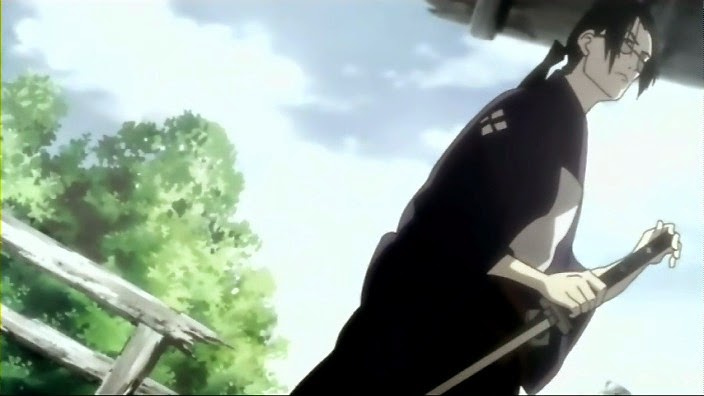Samurai Champloo is a romp through an alternate history of Japan, accented by out of place hip-hop references and several other anachronisms. This concept in and of itself makes a great setting, but the three main characters are where the show really shines. This is because they are all interesting, unique characters who complement each other perfectly, creating an archetype of human personality in general.
Jin 仁
Jin represents the moral, conforming part of us all. The single kanji in his name carries multiple meanings, including:
Virtue, as in the virtue and honor of a true samurai.
Humanity, as in what a society expects a person to be.
Benevolence, as in the ideal set of morals expected of a person.
This reflects in Jin’s personality in several ways. He is always calm and collected, and has a clear set of values (although he seems willing to throw these away occasionally). Beyond his obvious skill with a blade, this shows that Jin is a samurai, upholding a sense of honor
Jin’s character seems forced at times, almost to a tsundere level, and this is no accident. He tries so hard to keep his cool, even when it’s obvious that he has something else on his mind. He puts on airs of a perfected, honorary samurai, although several times throughout the series he throws away his oft-preached values for convenience or personal gain. He represents a frustrated human being, trying his hardest to conform to what is expected.
Fuu 風
Fuu represents the impulsive, stylish, clumsy side of us all. The kanji in her name paired with her character can be interpreted to mean:Manner, as in the way one feels, and personality.
Style, as in looks, fashion, individuality, and outward appearances.
Wind/Air, as in “whichever way the wind blows,” spontaneity, fun.
Fuu is always getting into trouble. She finds herself in the company of yakuza, accidentally forfeiting a contest on the verge of winning, and kidnapped on several occasions. Sometimes she rescues herself, and sometimes Jin and Mugen rescue her, but more often than not, her rescue is just as much of an accident as her getting into trouble in the first place.
There is a certain relatability in a character who makes so many mistakes; it adds a human element to her character and the anime itself. Alternately, it creates a moe aesthetic, because such mistakes are often seen as cute or loveable. As the only consistent female character in the show, she not only is a relatable human character, but an object of romantic interest for many viewers.
Fuu always does what she wants. The constantly-derailed plot of the show is her search for the “samurai who smells of sunflowers.” This plot was initiated by Fuu, who, opposing her local government, saved two clearly violent and dangerous samurai from execution and demanded that they accompany her in the journey. She is a brave, strong character who is also susceptible to outrageous missteps and hijinks. This makes her not only relatable, but a figure to be admired.
Mugen 無幻
Mugen’s name is more complicated. In essence, he is the crazy side of us all. Where Jin and Fuu represent different ways of fitting into society, Mugen turns that upside down. he is all about non-conformity, anti-authority, and impulse.
Mugen’s name is written as 無幻, which I interpret as “disillusioned.” This may seem like the opposite of his character, but hear me out. He doesn’t see things in terms of societal rules and standards. He looks at things with his primal, animal instincts. It’s kill or be killed, eye for an eye, survival of the fittest. When he kills a man for his money, it’s just because he wants the money. When he kills a man who made him angry, it’s just because he made him angry.
Mugen is also a word, when written as 無限, that means “unlimited.” Mugen is illiterate, but at one point in the series, he learns to write, and he writes his name as ∞. Mugen is disillusioned and as such, he isn’t limited by the chains of conformity. He has no code of honor, and doesn’t care what a samurai is supposed to be. He moves in the way he sees fit. If you were free from rules, and if you could get away with anything, how would you conduct yourself? That is exactly the idea that Mugen is based off of.
That’s It
This was just some conjecture I came up with while riding the bus to school one day, so don’t take it too seriously. Who are you most like? Who do you want to be like? Can you think of any other good examples of character balance like this? Let me know in the comments!








No comments:
Post a Comment